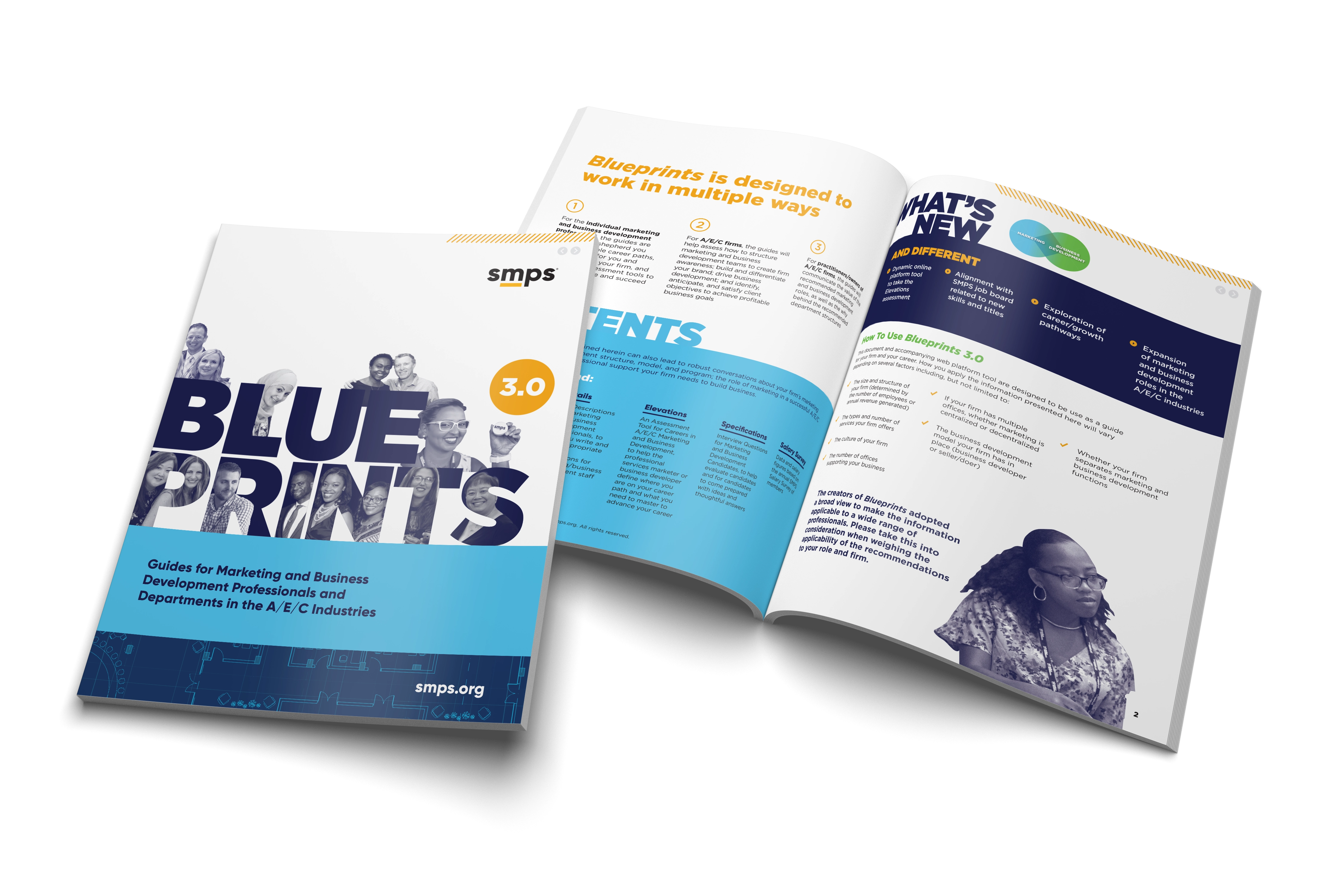



About

IN EVERY ISSUE
1.
PRESIDENT'S MESSAGE
Is the Opposite of Perfect Imperfect?

2.
CEO’S MESSAGE
Building Excellence for Business Growth

3.
FROM THE EDITOR
Welcome to the October 2024 Issue of the Marketer

Calendar of Events
4.

COLUMN
11.
MEMBER PERSPECTIVE
AI: A Tool for Excellence

12.
2024 SMPS Marketing Communications Awards Winners

13.
2024 MCA AWARDS
The 2024 MCA Judges

14.
2024 MCA AWARDS
Best of Show

15.
2024 SMPS MCA
People's Choice Award

16.
SMPS Recognition
Interview with Frank Lippert, FSMPS, CPSM

17.
SMPS Recognition
Announcing the 2024 Class of Fellows

18.
SMPS Recognition
Pearl-Grace Pantaleone Named Chapter President of the Year

19.
SMPS Recognition
2024 Marks the Inaugural Year for SMPS New Award Programs

20.
SMPS HQ
Congratulations to the New CPSMs

Five Simple Ways to Advance Your Career
Understanding Baseline Expectations
Developing a compliant proposal doesn't necessarily win you the project; it prevents you from being eliminated from the procurement process. Compliance is the baseline expectation. Clients expect your firm to follow the rules they have outlined in their requests for proposals. It's an initial test of what they can count on from your firm if selected for the project — will your team listen to and follow directions?
Winning proposals go beyond compliance. They add something extra that provides value for the prospective client. Maybe it's a compelling story about a similar project, a convincing cover letter that outlines the benefits the firm offers, or a detailed discussion of the firm's understanding of the project and its challenges and opportunities. There's something memorable about the winning proposal (or in the interactions leading up to the proposal) that makes the client say, "Yes — that's the firm I want to work with!" Clients reward the firms that go above and beyond the baseline expectations.
It's the same idea in your career. You are the firm submitting a proposal; your manager is the client. When your manager is responsible for a budget allocated to raises next year, they are not thinking, "Wow, Sally showed up on time for work this year; she's getting the big bucks!" The people who excel in their work — the people who exceed the baseline expectations are the ones who will be considered first for any reward or advancement opportunities.

The people who excel in their work — the people who exceed the baseline expectations are the ones who will be considered first for any reward or advancement opportunities.”
What does "excellent work" look like?
It starts with consistently achieving the baseline expectations — showing up on time, addressing all the details of the assignment, running spell check before sending it for review, following your firm's established processes — and then thinking, "What can I do to make this better?" Think about how to elevate the quality of your work product by doing your own compliance check, getting creative with your approach or content, or seeking out professional development opportunities. Think about and act on how you can broaden your impact on your firm's objectives, such as identifying (and even suggesting) process improvements, taking on a leadership role in a professional organization, or even simply asking your teammates, "Anyone need help with anything before I head out?" Doing excellent work builds trust — just as a client will select a trusted consultant repeatedly, your excellent work will open the door for more opportunities.
If you've ever found yourself asking, "Why do they get to work on that cool project?" or wondering what it takes for your manager to see that you're ready for what's next, here are five ways you can add a little something extra to your day-to-day responsibilities and advance in your career.
1. Understand the Assignment
Not every assignment comes with explicit instructions like a proposal. When your manager asks you to do something, make sure you understand the expectations before you start working. Don't be afraid to ask about the basics. "What's a design charrette?" or "You want social media drafts for LinkedIn and X, right?" Ask about the 'why' behind the project, like "How does this fit our strategic objectives?" or "What's the relative priority of this project?" There's no shame in not understanding everything your firm does or your department creates. But there is shame in saying, "Yes, I'll get right on it!" and then spending two days panicking because you don't know where to start. Ideally, your manager knows you need to understand the assignment to deliver. Asking questions indicates you care. It makes you look prepared. And it'll help build your confidence that you know what you're doing and understand your manager's expectations.
2. Apply a Learning Mindset
Learn all you can about your role and what your firm does. Expect your manager to fill in only some of the blanks. Take control of your growth and development. Work isn't school with a teacher and a set curriculum; it is a job where people who take the bull by the horns receive accolades and advancement opportunities. Attend company-hosted lunch-and-learns, identify training sessions you'd like to attend, or do some simple research before starting your next assignment. Use internal resources like your marketing files or database and external resources like the client's website or Wikipedia. Demonstrating a basic understanding of what your firm does makes you come across as more knowledgeable and will lead to a better work product. If you have a hunger for learning, you will advance more quickly than someone who waits for others to tell them everything.

3. Use Your Experience
To consider you for a promotion or a stretch assignment, your manager wants to see that you are learning from your previous assignments and able to apply that information to future assignments. Think carefully about how you can show this skill. Create a checklist for yourself ("Always use the Oxford comma" or "Bold firm name on first use in a section") so your manager isn't constantly correcting the same errors. Ask informed questions during an assignment. Rather than saying, "I'm not sure what this RFP is asking for," apply the knowledge you've learned by asking your manager, "The RFP is asking for X, which I typically address by doing Y, but it also asks for Z. Should I stick with Y, or do you recommend another approach?" On each assignment, ask yourself, "What can I do to improve this since the last time I did something similar?"
4. Take Pride in Your Work
Especially earlier in your career, your work product serves as the "proof" to your manager that you know what you're doing. Make the time to review your work before you send it to anyone to review — your boss, coworkers, or technical staff. Read your emails a second time, backcheck your work against the RFP or the assignment email, and make sure no new information (like an addendum) got missed. Make sure that your work reflects what you want others to attribute to you: your experience and knowledge of the project.
Make sure you understand the consequences of not “crossing the t’s.” When you send a low-quality product to your manager to review, you're asking your manager to spend their limited review time cleaning up your errors rather than providing feedback that will help you grow. If your manager must focus on corrections rather than ideas to help you elevate the product, they likely won't see you as ready for a promotion because it appears that you are still learning the basics of your current role.
Make the time to review your work before you send it to anyone to review — your boss, coworkers, or technical staff.”
5. Seek Out Feedback — and Act on It
Just like you're busy handling day-to-day assignments, your manager constantly juggles many tasks. They may not always think to provide you with regular feedback, positive or negative. Use check-ins with your manager (and your annual review) to ask questions about how you're doing and plan to act on your manager's responses. Even if you disagree with the feedback, it's telling you important information about how your manager perceives you. Listen to the opportunities for growth and then act on them. Seek out ways to show your boss how you are progressing. If you're feeling ready to move up to the next level or take on stretch assignments, practice articulating what you currently do and would like to do. Talk to your manager about what needs to happen for you to get where you want to go.

Own Your Career
Your career can be whatever you want to make of it — but you have to take ownership of your performance. By following these five tips, you'll be creating a solid foundation from which to grow and succeed! For an in-depth resource for marketing and business development career paths in the A/E/C industries, consider investing in SMPS Blueprints.
Jen McGovern, CPSM, is the Mid-Atlantic Regional Capture Manager for VHB, a 2,000-person planning, engineering, and environmental services firm with 30 offices along the East Coast. In her 9-year tenure at VHB, Jen has supervised and mentored dozens of marketers. Jen is currently the Chapter Advisor of SMPS Washington, DC, and serves on the Editorial Committee for SMPS Marketer journal. She achieved her CPSM certification in 2015.

Connect with Jen on











